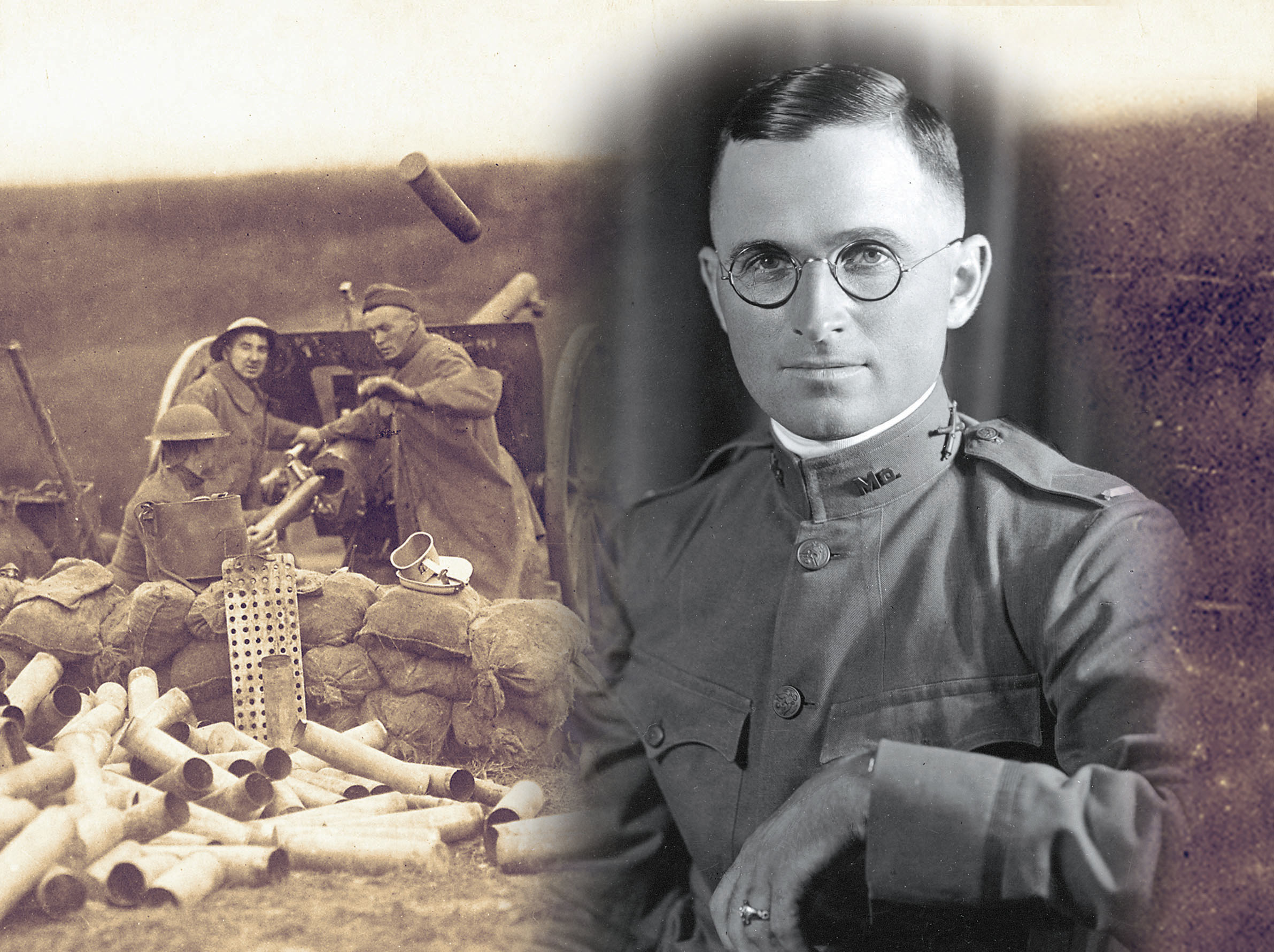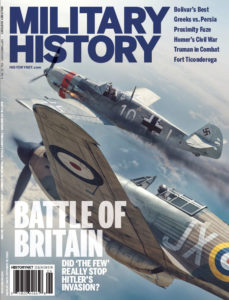Harry S. Truman had only been vice president of the United States for 82 days when urgently summoned to the White House on April 12, 1945. First Lady Eleanor Roosevelt greeted the then 60-year-old former senator from Missouri and gently touched his shoulder. “Harry,” she told him, “the president is dead.” Franklin Delano Roosevelt had been recovering from exhaustion in Warm Springs, Ga. While sitting for a portrait artist, he’d suddenly complained of a “terrific headache” and slumped over, unconscious. Two hours later the 63-year-old was pronounced dead. He’d suffered an intracerebral hemorrhage.
Truman asked the First Lady what he could do to help. “Is there anything we can do for you?” she replied. “For you are the one in trouble now.” That evening, still reeling from the shock of Roosevelt’s death, Truman was sworn in as the nation’s 33rd president.
Journaling from the battlefront of World War II in Europe Lt. Gen. George S. Patton Jr. was among several senior U.S. military leaders to express displeasure over the ascension to the Oval Office of a man they considered too weak and indecisive to be wartime commander in chief. “It seems very unfortunate that in order to secure political preference,” Patton wrote, “people are made vice presidents who were never intended, neither by party nor by the Lord, to be presidents.”
But as Patton and other wary Americans would soon discover, the Missourian did indeed have the leadership skills and steely determination his new position required. He’d developed those vital traits as a soldier, for Truman was the only American president to have seen combat in World War I.
Harry S. Truman—his middle initial honoring both his paternal and maternal grandfathers, Anderson Shipp Truman and Solomon Young—was born May 8, 1884, in Lamar, Mo., and grew up in Independence. His early life gave little indication of the military and political paths he would ultimately follow; his favorite childhood pastimes included reading, studying history and playing music. His poor eyesight compelled him to wear thick-lensed glasses throughout his life.
As a young man Truman worked on the railroad and pursued several unsuccessful business ventures built around mining and oil. Showing some aptitude for finance, he found work in 1903–04 as a clerk at rival banks in Kansas City. Among his coworkers was Arthur Eisenhower, an older brother of future general and president Dwight D. Eisenhower.
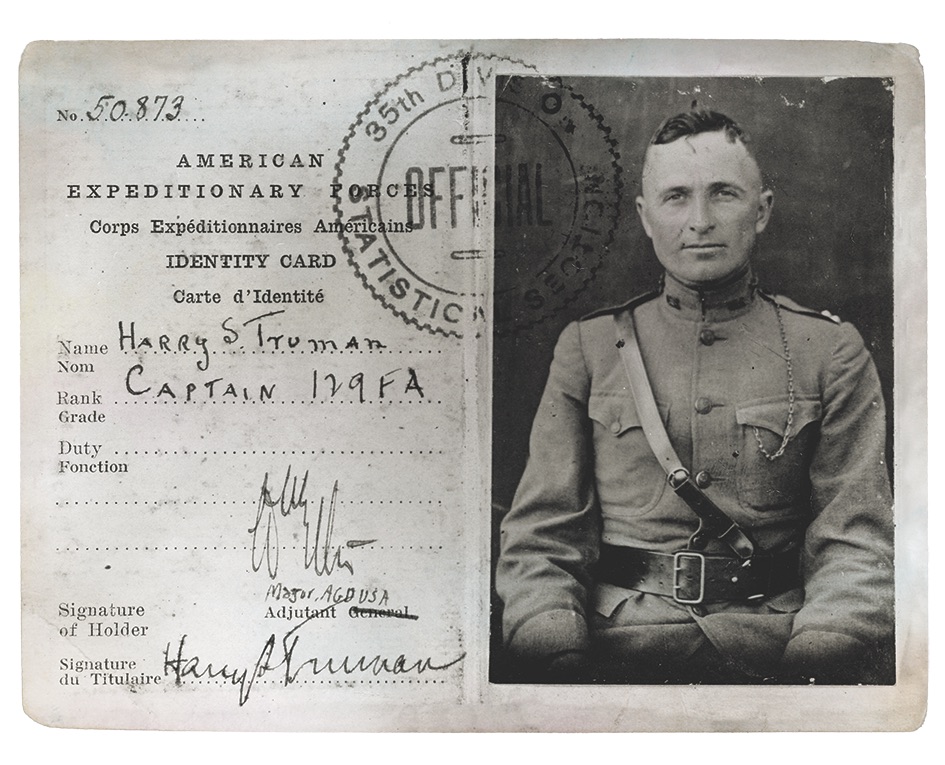
Unable to pay for college and prevented by his poor eyesight from attending the U.S. Military Academy at West Point, N.Y., Truman in 1905 enlisted in the Missouri National Guard’s newly organized Battery B light artillery company. (He passed the entrance exam on a second attempt after memorizing the eye chart.) He served as the battery clerk, rising to corporal in 1906, before returning home to help run the failing family farm.
For more than a decade Truman struggled alongside his father, but when the latter died in 1914, the farm was $12,500 in debt (more than $300,000 in today’s dollars). Two years later, on the death of his Uncle Harrison Young, for whom he’d been named, Truman inherited $11,000. Unfortunately, he sank much of the windfall into bad investments. He also bought a bright red Stafford touring car for trips to see his beloved, Elizabeth “Bess” Wallace, who, after turning down his first proposal, had consented to be his wife. The formalities would have to wait.
On April 6, 1917, the United States declared war on Germany, finally entering the European conflict that had been raging since 1914. Thirty-two-year-old Truman re-enlisted in the Missouri National Guard and was commissioned a first lieutenant in the 2nd Missouri Field Artillery. That summer the regiment was expanded and reorganized, and on August 5 it was redesignated as the 129th Field Artillery and formally assigned to the 35th Division, its men sworn in to federal service. A month later the regiment shipped out for Camp Doniphan at Fort Sill, Okla., for advanced training. It was there Truman befriended fellow Lt. Jim Prendergast, whose politically connected uncle would transform Harry’s life after the war.
In February 1918 Truman was among a select group of 10 officers and 100 enlisted men detailed to go overseas for further training in France. The troops left Fort Sill on March 20 on an eastbound train to Camp Merritt, N.J. Before sailing to Europe, Truman and four fellow officers visited Manhattan, where they rode the subway, had supper, took in “the rottenest vaudeville show” at the Winter Garden and strolled up Broadway after dark. The Midwesterner considered the city overrated. “As far as bright lights go,” he wrote to Bess, “they looked no brighter to me than 12th Street [in Kansas City] most any night.” Truman also rode a high-speed elevator to the observation deck of the 792-foot Woolworth Building, which he admittedly enjoyed.
Far less pleasant events awaited the future president on the other side of the Atlantic.
On March 30, 1918, Truman was one of 7,000 doughboys aboard the troop transport USS George Washington, a confiscated German luxury liner, as it departed Hoboken, N.J., for France. Two weeks later the vessel steamed into the crowded harbor at Brest on a sunny April morning to be welcomed by bands and flag-waving French civilians.
After a brief stay in Brittany the officers and men of Truman’s detail were sent to the Second Corps Field Artillery School at Montigny-sur-Aube, a few hours’ drive southeast of Paris, for five weeks of intensive study and field training. They then rejoined the rest of the regiment in Brittany at Camp Coëtquidan, which a century earlier Napoléon Bonaparte had established as an artillery school. After training the bookish Truman was promoted to captain and made battalion adjutant. On July 11—much to his and undoubtedly others’ surprise—he was given command of Battery D. Comprising largely Irish and German Catholics who had known one another since high school, the unit of undisciplined brawlers and drinkers was widely known as the “Dizzy D.” Its gunners were decidedly unimpressed by the four-eyed “farm boy” tapped to be their new commander, a man whom most of the company’s members predicted would last no longer than 90 days.
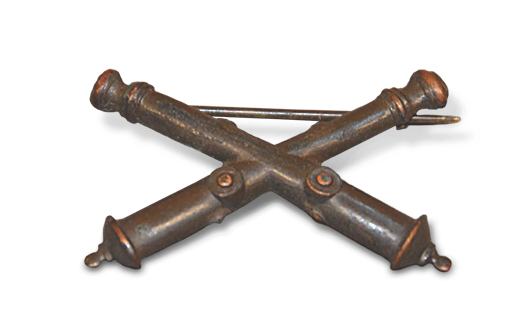
Truman himself was daunted by the prospect of commanding the notoriously rough-and-tumble battery. “I’ve been badly frightened several times in my life,” he recalled, “and [the morning] I took over that battery was one of those times.” Worse yet, the young captain’s unease was apparent. “Truman’s knees were knocking together,” remembered Sgt. Edward McKim, while Pvt. Floyd Ricketts thought the captain “gave the impression of a professor more than he did an artillery officer.” By way of a welcome the men staged a drunken brawl that night.
The next morning Battery D woke to a shock. A typed sheet pinned to the unit bulletin board noted the demotion of half of the noncommissioned officers and most of the privates first class. A different sort of captain faced his noncoms that morning, one showing no fear. “I didn’t come over here to get along with you!” Truman barked. “You’ve got to get along with me. And if there are any of you who can’t, speak up, and I’ll bust you right back now.”
But Truman was no one-dimensional military martinet; he truly cared about the welfare of his troops. He did what he could to improve their food and living conditions, ensured they got paid on time and made sure they wrote to their mothers and sweethearts. He was also quick to praise and promote those who merited it. With two new pairs of aluminum-framed glasses he’d bought in New York, the once timid officer was ready for battle—albeit admittedly intimidated at the thought of facing the enemy. “I have my doubts about my bravery when heavy-explosive shells and gas attacks begin,” he wrote to Bess. “I have the bravest kind of head and body, but my legs won’t stand.”
Truman’s first action came in late August 1918 amid the mud and mire of the Vosges Mountains in Alsace. Battery D had moved into position on the reverse slope of a hill and began firing on German positions atop another hill. “We were firing away and having a hell of a good time doing it, until they began to fire back,” recalled Sgt. Vere C. Leigh. The rain of enemy shells crawled steadily toward the American trenches. “Run, boys!” shouted 1st Sgt. Meigs Woolridge, the battery’s senior NCO. “They got a bracket on us!” The soldiers “scattered like partridges,” Truman later wrote, prompting him to call them “everything I knew.” By standing his ground and cursing the men in language they understood, Truman won their respect and coaxed them back to their guns. “My greatest satisfaction,” he wrote Bess, “is that my legs didn’t succeed in carrying me away.”
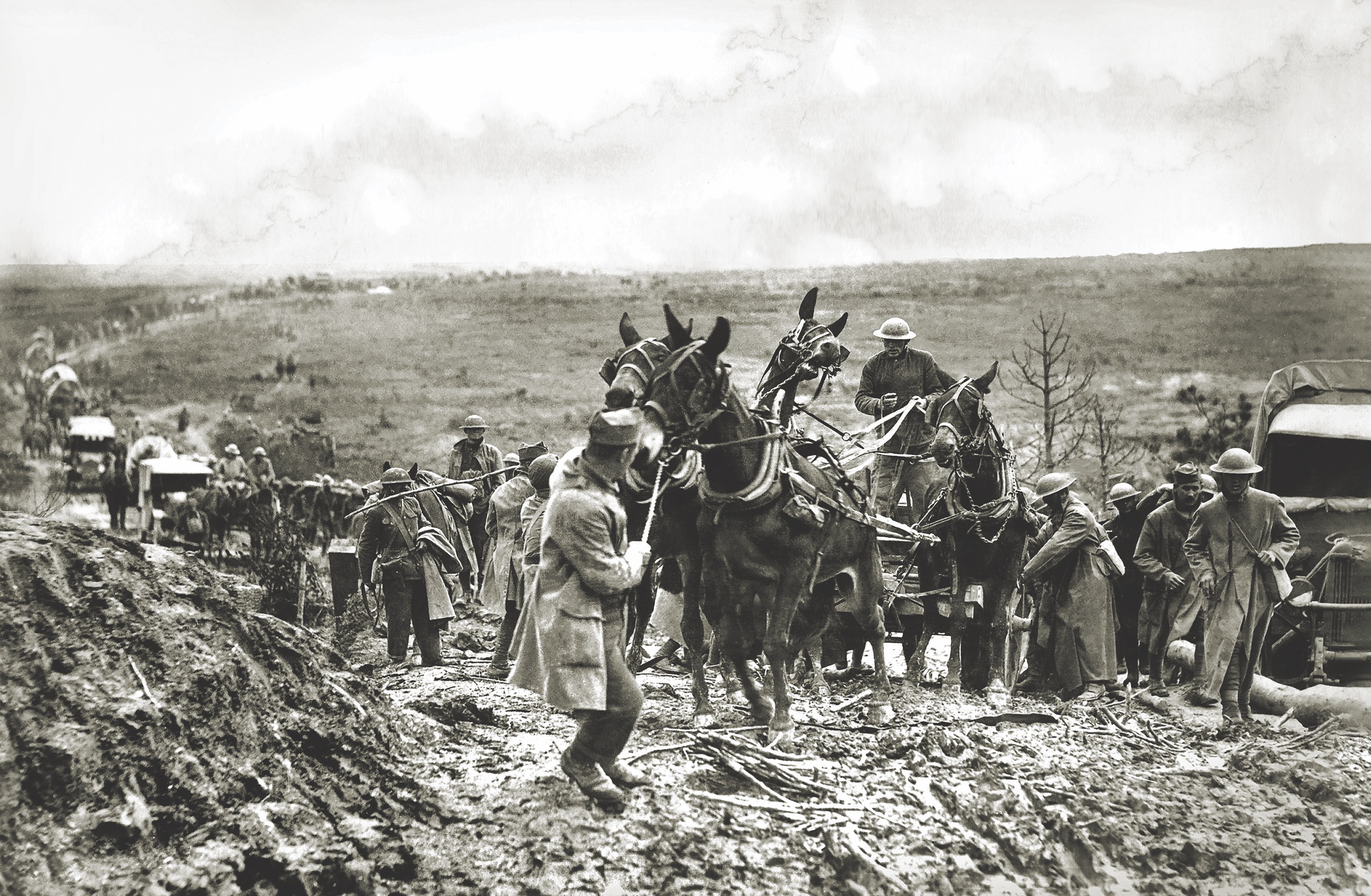
In early September the 129th Field Artillery undertook a long and challenging redeployment, using teams of horses to trundle artillery pieces and wagons full of ammunition and supplies over 100 miles of muddy back roads from the Vosges north to the Meuse-Argonne, the new American sector. On September 12 U.S. and French troops under American Gen. John J. Pershing attacked German forces in the Saint-Mihiel salient, with Battery D in reserve. Two weeks later, at the start of the massive Meuse-Argonne offensive, Truman’s rested gunners played a key role, opening withering fire on enemy positions before dawn and expending some 3,000 rounds of 75 mm ammunition in just four hours.
“My guns were so hot that they would boil [the] wet gunnysacks we put on them to keep them cool,” Truman wrote to Bess. “I was deaf as a post from the noise. It looked as though every gun in France was turned loose.” During the same offensive Truman’s gunners fired in support of a mixed American-French tank brigade commanded by then Col. George S. Patton Jr. Engaging German field guns, Battery D was credited with forcing the abandonment of two enemy batteries.
Another important clash came amid intense fighting in an orchard outside Cheppy. German aircraft were strafing Battery D and dropping hand grenades on the American gunners when Truman noted two enemy batteries moving into firing position. Anticipating the danger, he quickly gave orders to hitch the teams to his guns and pull out. “Where we had just left, boy, the shells were just raining in there,” Sgt. McKim recalled. “We would’ve been caught, but we were a hundred yards away by that time—just intuition on [Truman’s] part that we got out of there.”
In the closing weeks of the war the 129th Field Artillery moved into action for the final time on the battlefields of Verdun, where the mingled remains of French and German soldiers killed during the 302-day battle of 1916 still littered the ground. Battery D’s 75 mm guns fired the last of some 10,000 wartime rounds just minutes before the Armistice took effect at 11 a.m. on November 11. During a later inspection of the troops of the American Expeditionary Forces by Pershing and Britain’s Prince of Wales (the future King Edward VIII) Pershing shook Truman’s hand and said, “You have a fine looking bunch of men, Captain. And I hope you will take them home as clean morally and physically as they were when they came over so that the people at home can be as proud of them as I am.”
Whether the men of Battery D were “clean” in either sense is debatable, but the fact that only one of their number had been killed and one wounded in action said much for Truman’s leadership. Before returning stateside the captain put in for seven days’ leave and took a whirlwind tour of France, soaking in Paris by dining at Maxim’s, attending the Folies Bergère, visiting Notre Dame and touring the Champs-Élysées by taxi. Aboard the troop transport home in April 1919 his men took up a collection from the proceeds of their craps games for an engraved loving cup they proudly presented to Captain Harry S. Truman…in appreciation of his justice, ability and leadership. On May 6 the 129th Field Artillery mustered out at Camp Funston, Kan.
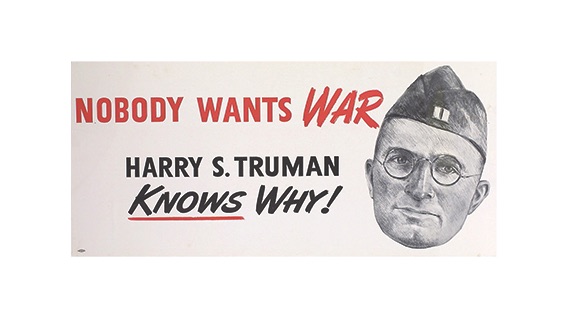
Just as World War I brought about seismic social, political and economic changes worldwide, it also transformed Harry Truman. As a little boy he’d been forbidden by his mother to play roughhouse games, as she didn’t want him to lose or break his glasses. The adolescent Truman, biographer David McCullough noted, had been “a bookworm—a sissy, as he said himself later on, using the dreaded word.” As a young man he’d been a failed farmer and luckless investor. But his experiences in World War I transformed him into a decisive leader unafraid to speak his mind. The conflict tested his courage, his resourcefulness and his core values, and he was not found wanting. And, finally, the war introduced him to people of social and economic strata far above his own, many of whom proved invaluable to the trajectory of his political career.
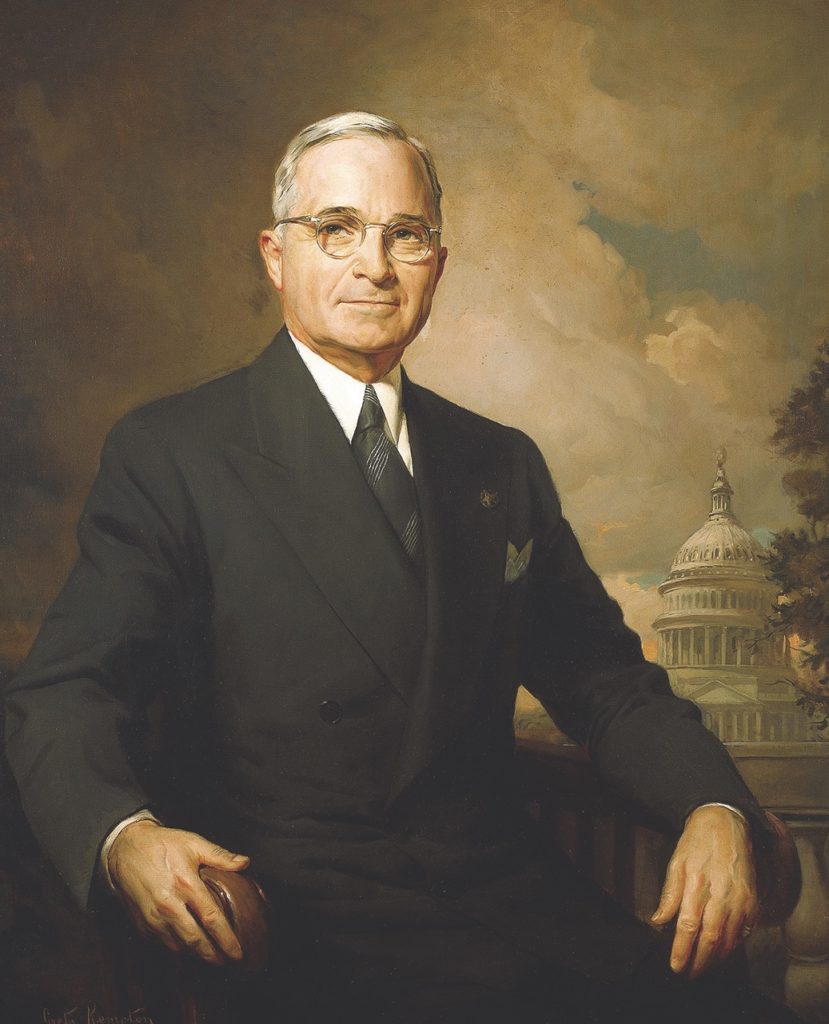
Returning home in 1918, Truman finally married Bess. He then opened a haberdashery and entered politics, first becoming a district judge, then a U.S. senator, vice president and president, winning reelection in 1948 against expectations. Those who’d watched him falter in his early years were likely stunned by his political rise, and by the resolve he showed in dropping two atomic bombs on Japan to end World War II. Truman later clashed with General of the Army Douglas MacArthur over the conduct of the Korean War, showing no hesitation at dismissing the “hero of the Philippines” before going on to deal with the “red scare” of communism and laying groundwork toward the civil rights movement.
On leaving office in 1953, Truman packed the trunk of his Chrysler New Yorker and hit the road with Bess, traveling to the East Coast and back again. Returning to Independence with only his military pension to support them, he struggled financially until publishing his popular memoirs. Otherwise, he remained largely out of politics and the public limelight. Addressing the impoverished chief executive’s financial plight, Congress granted all living former presidents a pension in 1958. Though Herbert Hoover was independently wealthy, he accepted his pension so as not to further embarrass Truman.
The artillery captain who a half century earlier had brought his gunners safely back from the Western Front died at age 88 on Dec. 26, 1972, in Kansas City, Mo. MH
A frequent HistoryNet contributor, Los Angeles–based Liesl Bradner is the author of Snapdragon: The World War II Exploits of Darby’s Ranger and Combat Photographer Phil Stern. For further reading she recommends The Accidental President: Harry S. Truman and the Four Months That Changed the World, by A.J. Baime; The Autobiography of Harry S. Truman, edited by Robert H. Ferrell; and Where the Buck Stops: The Personal and Private Writings of Harry S. Truman, edited by Margaret Truman.
This article appeared in the September 2020 issue of Military History magazine. For more stories, subscribe here and visit us on Facebook:

